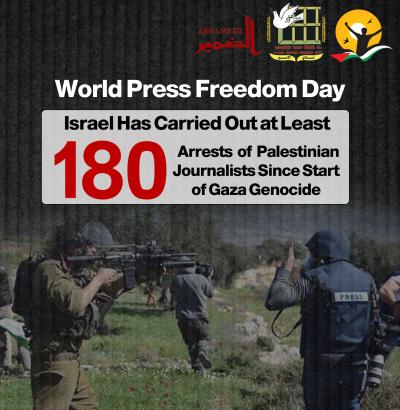
Commission of Detainees’ Affairs, Palestinian Prisoner’s Society, & Addameer Prisoner Support and Human Rights Association
Ramallah, Palestine - Israeli occupation forces have carried out at least 180 arrests among Palestinian journalists both in the West Bank and Gaza since the start of the genocide in October 2023, Palestinian prisoner defense groups said on the occasion of World Press Freedom Day marked annually on May 3.
Among the 180 arrests, 49 Palestinian journalists who were detained after the genocide began remain behind bars, in addition to six others who were arrested beforehand.
This period has been the deadliest in the history of Palestinian journalism. The Israeli occupation targets Palestinian journalists in a systematic policy of killings and arrests. According to the Palestinian Journalists Syndicate, more than 200 journalists have been killed since the start of the genocide.
The targeting of Palestinian journalists—whether through assassinations or arrests—has historically been one of the main policies employed by the occupation, and it has escalated to an unprecedented level since the genocide began. The attacks on journalists have marked a critical and painful chapter in the history of Palestinian journalism, especially in Gaza. The occupation has not only targeted them while doing their journalistic work but has also systematically targeted their families. Many journalists and their families have been killed during the genocide as part of the occupation's retaliatory efforts. Families have been turned into targets and tools of intimidation and revenge in a continuous attempt to silence journalists and assassinate the truth and details of the genocide in Gaza.
Prisoner groups noted that the occupation continues to forcibly disappear Palestinian journalists Nidal Al-Wahidi and Haitham Abdel Wahid who were abducted from Gaza. Since October 7, the occupation has refused to reveal their fate - whether they are alive or not - despite efforts by numerous human rights organizations and ongoing demands for information. It is known that the occupation employed enforced disappearance broadly against detainees from Gaza. This persisted until certain legal amendments allowed the disclosure of detainees’ whereabouts in prisons and camps, but the practice has not stopped — with many detainees from Gaza remain forcibly disappeared.
Among the 49 detained journalists, 19 are being held under the so-called “administrative detention” policy without trial or charge. This policy has affected thousands of Palestinians in an ongoing attempt to impose greater control and censorship, depriving them of their right to freedom of opinion and expression, and preventing them from exposing the occupation’s crimes that permeate every aspect of Palestinian life. Many journalists have been subject to administrative detention — some have been released, while others remain imprisoned. One such case is journalist Nidal Abu Aker from Bethlehem, who has spent nearly 20 years in occupation prisons, most of it under administrative detention.
The occupation has transformed social media platforms and journalistic work from tools of free expression into tools of repression and pretexts for arrest, under the guise of so-called “incitement.” The occupation deliberately crafted vague definitions of “incitement and sympathy” without clear parameters, enabling it to use them as weapons against journalists in particular, and Palestinians in general, to imprison them on a mass scale.
Detained journalists face all the violations endured by other prisoners, including systematic torture, severe beatings, starvation, medical neglect, and continuous humiliation and abuse. They are held under harsh and degrading detention conditions and are continuously deprived of their rights.
Prisoner institutions renew their demands for the immediate release of detained journalists in Israeli prisons and for the disclosure of the fate of Gaza’s disappeared journalists. They also call on the United Nations and all international bodies to assume their responsibilities regarding the crimes committed by the occupation against detainees, and to move beyond merely issuing reports and statements by ending the systematic inaction in the face of the ongoing genocide and aggression.